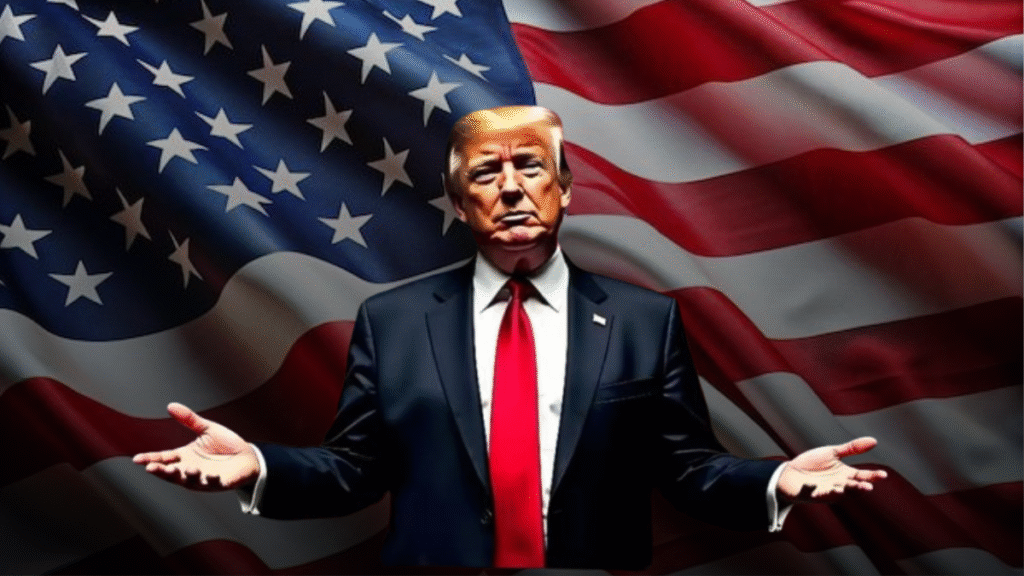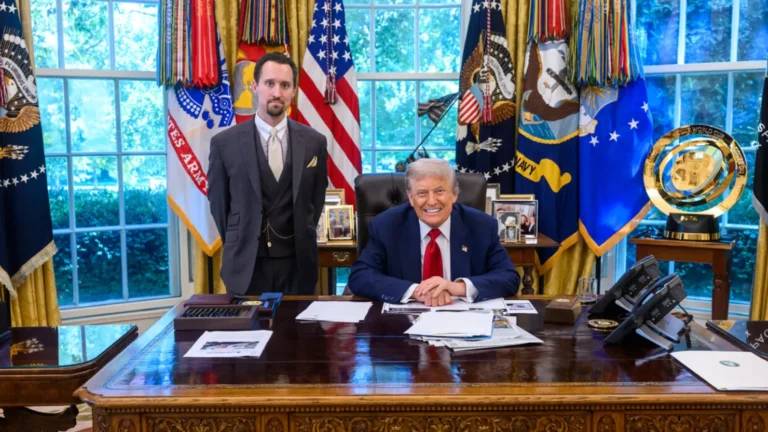
In a significant legal development
a federal appeals court has struck down most of President Donald Trump’s global tariffs, dealing a blow to a central component of his trade strategy. The U.S. Court of Appeals for the Federal Circuit ruled by a 7-4 majority that the statutory authority Trump used to impose his sweeping tariffs—including reciprocal tariffs—did not in fact give him the authority to unilaterally impose such measures.
The court emphasized a fundamental principle of constitutional law:
the authority to impose tariffs and trade restrictions rests solely with Congress, not the executive branch. The decision effectively invalidates, at least temporarily, most tariffs imposed under the Trump administration. However, the decision is not final and will not take full effect until October 14, giving the Trump administration an opportunity to appeal to the Supreme Court.
Thank you for reading this post, don't forget to subscribe!During this period, the administration could try to overturn the decision or delay it further. President Trump reacted strongly to the decision and called the court “deeply partisan”, calling it unjust. He expressed confidence that the Supreme Court would ultimately side with him, and also said that the court’s decision could have a negative impact on the US economy.
Trump argued that tariffs are a necessary tool to protect American industries and secure better trade agreements, and claimed that the court’s decision would weaken the country’s position in global trade negotiations. The decision is a turning point in the ongoing debate over the president’s authority in trade policy and highlights the ongoing tension between the executive and Congress over the right to impose tariffs. As the legal process progresses, many will be watching closely to see whether the Supreme Court upholds, modifies, or overturns the decision, which could have long-term implications for US trade policy.
On Friday, a significant legal development occurred when the court handed down its decision in the highly controversial case of V.O.S. Selects v. Trump.

This was former President Donald Trump’s second consecutive defeat in this landmark case, which has attracted a lot of attention in political and legal circles. The case arose from lawsuits filed by a coalition of twelve states and five small American businesses challenging Trump’s broad use of the International Emergency Economic Powers Act (IEEPA). The main issue centered on whether the president had the constitutional and statutory authority to impose sweeping tariffs under the guise of a national emergency.
Supporters of the decision, including lawyers at the Liberty Justice Center, praised the court’s decision as an important victory for American businesses and consumers. They emphasized that the decision reaffirms the principle that even the president must act within the boundaries of the rule of law and prevent unchecked executive power. In contrast, the Trump administration argued in its defense that the IEEPA provides broad authority to impose tariffs and other economic measures in times of national crisis.
They argued that such measures are necessary tools to protect the country’s economic interests. However, the administration has also suffered setbacks in this legal battle. Notably, in May, the US Court of International Trade rejected the administration’s broad interpretation of the IEEPA and ruled that the president’s authority is limited in scope and does not permit the sweeping tariffs previously imposed. This ongoing case underscores the ongoing tension between executive power and legal limits, and the president’s purview in economic matters.
The ruling highlights the importance of judicial oversight in shaping the limits of the U.S. authority.
A federal court temporarily put its ruling on hold in a key trade dispute while former President Trump persists on appeal. During oral arguments in July, the judges appeared to openly doubt the administration’s legal position, raising questions about the legitimacy of the tariffs in question. This skepticism culminated in a landmark ruling issued on Friday, where the Court concluded that the tariffs challenged by plaintiffs exceeded the authority granted to Trump under the International Emergency Economic Powers Act (IEEPA).
A majority of the judges emphasized that the scope of both the smuggling and reciprocal tariffs imposed by the administration was remarkably broad. These measures targeted a wide range of goods and included many countries, whose tariff rates were high, variable, and often higher than standard U.S. tariffs. In addition, the Court pointed out that these tariffs had no clear, set expiration date, further weakening their legitimacy under existing laws.
However, the decision was not unanimous.

Four justices disagreed with the majority’s interpretation, arguing that the plaintiffs had not sufficiently proven that a failure to meet the summary judgment they sought had occurred. Among the twelve justices involved in the case, this dissent highlighted differing views on the limits of executive power during a national emergency and the proper scope of tariffs under U.S. law.
The decision marks a turning point in the ongoing debate over the president’s authority in trade policy and the legal limits of emergency powers. A recent assessment by the Congressional Budget Office suggests that imposing tariffs could have a significant impact on the fiscal position of the United States, reducing the national deficit by approximately four trillion dollars over the next decade.
This estimate highlights the economic benefits that some policymakers attach to protective trade measures, and emphasizes their potential to bolster government finances through increased revenue and possibly stimulate domestic industries. Such prospects are also controversial, however, as tariffs’ broader implications extend into the realms of foreign policy and national security. Commerce Secretary Howard Lutnick expressed deep concern over the potential rollback of tariffs imposed by former President Donald Trump under the International Emergency Economic Powers Act (IEEPA).
Lutnick warned that the rollback of these tariffs could cause “severe and irreparable harm” to the foreign policy objectives and national security interests of the United States. He argued that such a move could undermine strategic partnerships, provoke retaliation from foreign trading partners, and threaten existing trade agreements. In addition, Lutnick emphasized that ongoing negotiations could be affected, creating instability in international relations and economic cooperation.
Adding fuel to the ongoing debate, a federal appeals court recently issued a significant ruling on the president’s jurisdiction in trade matters.
In a 7-4 majority decision, the court found that President Trump had exceeded his constitutional authority by imposing sweeping import tariffs on nearly every country. The court explained that although the law grants the president emergency powers to deal with emergencies, it does not explicitly authorize the imposition of duties or taxes on imports. These duties, announced in April of that year, sparked widespread controversy and legal challenges, highlighting the complex legal and diplomatic issues associated with executive trade powers.
This decision This signals a possible curtailment of the president’s authority in future trade policy decisions and raises questions about the limits of executive power in economic matters. A recent court ruling marked a turning point in the debate over the president’s authority in trade policy. The court struck down all of former President Trump’s tariffs, saying they exceeded legal limits set by Congress. During his administration, Trump imposed a number of tariffs, starting with a baseline of 10% and then increasing it in response to unfair trade practices by other countries. Notably, he imposed a 50% tariff on Lesotho and a 10% tariff on an uninhabited island with penguins, among other measures.
Trump justified these tariffs under the International Emergency Economic Powers Act (IEEPA), claiming they were necessary to protect US economic interests during a declared national emergency. However, the court’s decision challenged this justification. It emphasized that Congress had not authorized such a broad and unrestricted use of presidential powers. The ruling described Trump’s tariffs as “unlimited in scope, amount, and duration,” and emphasized that they went far beyond any explicit authority granted by existing laws.
Although a federal trade court declared similar tariffs illegal in 2022, this latest decision affirms and expands that decision, and emphasizes the limits of executive power in trade matters. The decision underscores the ongoing tension between the executive’s desire for flexibility during international crises and Congress’s role in setting legal limits.
The Court’s decision serves as a reminder that tariff policies must be based on explicit legal authority, so that future administrations can avoid unilaterally enacting such sweeping measures without legislative approval. As a result, the decision is expected to affect the scope of the president’s powers in future trade negotiations and economic policy, reaffirming the importance of congressional oversight in matters of international trade.
Most conservatives balk when they say the U.S. Supreme Court has the legal authority to change U.S. trade policies as president. What does this mean for Trump’s trade agenda? The government said some imports may need to be returned and returned to the U.S. Treasury Department if Trump’s tariffs are lifted. As of July, total tariff revenue was $159 billion, more than double the amount of the year-ago period. The Justice Department warned in a legal presentation this month that ending the tariffs could mean “financial waste” in the United States.
The decision could also put a damper on Trump’s future attempts to set prices.
The president has an alternative law that imposes tariffs, but they limit their speed and severity. In its May ruling, the Trade Court declared that Trump had limited authority to introduce tariffs to reduce trade losses according to the 1974 Trade Act. However, the law limits tariffs in these countries by 15% to just 150 days. What was Trump’s rejection? He is not happy.
Trump announced dozens of social networks on Friday evening when the court’s decision was criticized.
On his website on the social network, Trump said that when the judges decided against him, it was decided by a “strongly biased court”, the kind he often made. Trump wrote: “If these costs are removed, if they are removed, it will be a serious disaster for the country.” He also said, “If they are allowed to remain like this, this decision will actually destroy the United States. The prices have created economic and political uncertainty in the world and raised fears of inflation.







